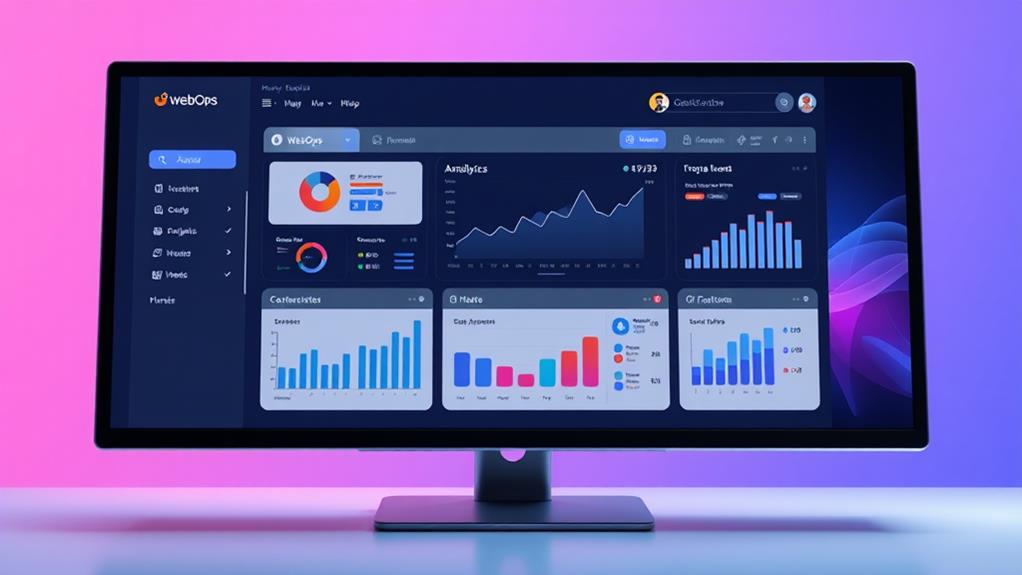Pantheon's leader shares a vision for CMS and WebOps future characterized by AI integration, personalized content delivery, and predictive analytics. The impact extends to collaboration efficiency, flexible architectures, and real-time tools for improved performance. Decoupled architecture brings increased productivity and customized solutions, nurturing dynamic digital experiences through collaborative efforts. Tech economy challenges are addressed with operational efficiency, innovative solutions, and resource optimization through WebOps. Future trends promise advanced personalization, customized content, and sophisticated brand–consumer interactions. This insightful revelation of technologies reshapes digital experiences and advances website management practices, highlighting a transformative terrain ahead.
Key Takeaways
- AI integration for personalized content delivery.
- Streamlined workflows with WebOps for collaboration.
- Decoupled architecture for enhanced productivity.
- Addressing tech economy challenges with innovative solutions.
- Future trends: AI, personalization, and advanced digital experiences.
Advancements in CMS Technology
In the constantly evolving world of content management systems (CMS), advancements continue to shape the way websites are built and maintained. AI integration and machine learning applications are revolutionizing CMS technology, offering improved capabilities for website creators. AI integration enables personalized content delivery, improved user experiences, and streamlined content management processes.
Machine learning applications aid in predictive analytics, content optimization, and automated tasks, enabling users to make data-driven decisions. These advancements not only optimize website performance but also drive innovation in digital experiences.
As CMS platforms evolve to incorporate AI and machine learning functionalities, the future of website management looks promising with increased efficiency, improved user engagement, and dynamic content delivery.
WebOps Impact on Website Management
With the rapid advancements in technology shaping the environment of website management, the impact of WebOps on streamlining operations and improving digital experiences cannot be understated. WebOps technology offers collaboration efficiency and scalable infrastructure, enabling businesses to optimize website creation and management. By leveraging WebOps, companies can do more with less, especially in challenging economic times, as it reduces spending, increases efficiency, and improves web performance. This technology enables cross-functional teams to work seamlessly together, driving strategies simultaneously. To illustrate further:
| Collaboration Efficiency | Scalable Infrastructure |
|---|---|
| Streamlined workflows among teams | Flexible architecture that grows with business needs |
| Real-time collaboration tools | Automated scaling for high traffic periods |
| Integrated communication platforms | Efficient resource allocation for enhanced performance |
Decoupled Architecture Benefits
The evolution of WebOps technology has significantly impacted website management practices, highlighting the importance of streamlined operations and improved digital experiences.
Decoupled architecture offers increased productivity and seamless collaboration opportunities among cross-functional teams. By separating the frontend and backend components, companies can optimize their workflow efficiency and enable developers, content creators, and marketers to work together more effectively.
Embracing decoupled architecture allows businesses to adopt flexible solutions tailored to their specific needs, fostering innovation and agility in digital projects.
The advantages of decoupled architecture go beyond traditional CMS limitations, enabling companies to create dynamic and engaging digital experiences while maximizing productivity through collaborative efforts.
Addressing Tech Economy Challenges
Amidst the ever-changing setting of the tech economy, organizations are faced with the urgent need to navigate challenges while upholding operational efficiency and digital relevance. Remote work challenges have intensified, requiring innovative tech solutions to ensure smooth collaboration. Budget constraints further complicate matters, necessitating the implementation of creative innovation strategies to optimize resources effectively.
Embracing technologies like WebOps can alleviate these pressures by enabling teams to achieve more with less, streamlining processes, reducing spending, and enhancing overall web performance. As companies work to adjust to the evolving environment, leveraging WebOps technology emerges as a crucial solution in addressing the complexities of the tech economy while promoting sustainable growth and competitiveness.
Future Trends in Digital Experiences
In an era driven by technological advancements and evolving consumer demands, the environment of digital experiences is set for significant transformation. Future trends in digital experiences are anticipated to heavily feature AI integration and advanced personalization strategies. As AI continues to evolve, it will play a crucial role in enhancing user experiences by providing tailored content and interactions.
Personalization strategies, powered by AI and machine learning, will enable businesses to deliver more targeted and engaging digital experiences to their audiences. Embracing these technologies will not only shape the future of digital experiences but also pave the way for more sophisticated and impactful interactions between brands and consumers.
Conclusion
In conclusion, the evolution of CMS technology and the rise of WebOps solutions are poised to revolutionize website management and improve user experiences. Despite concerns about the potential intricacy of implementing decoupled architecture and integrating advanced technologies like AI and machine learning, the strategic adoption of these innovations is essential for businesses to stay competitive in the tech economy. Embracing these advancements will drive efficiency, reduce costs, and deliver exceptional web performance in the digital environment.








